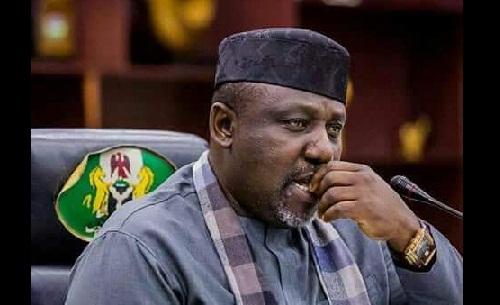As the debate over the rising cost of governance in Nigeria rages and the political elite appears undecided about what to do, the Italian parliament has passed a constitutional reform that would cut the number of lawmakers by over one third in that cash-strapped European country.
Based on the reform, the number of senators in the Upper House is to drop from 315 to 200, while those of deputies in the Lower House will be reduced from 630 to 400 from the next legislature.
The reform, according to reports, will streamline governance and could save Italy up to 100 million euros (N38.5billion) each year. It would also make the Italian parliament among the smallest national legislatures in the European Union.
However, the story is different in Nigeria as a recent attempt to champion a similar reform that could reduce the number of lawmakers in the National Assembly was rebuffed despite the general perception that the parliament has become a drain pipe.
The National Assembly in Nigeria is made up of 109 members in the Senate and 360 members in the House of Representatives. The average annual budget of the federal parliament has been N150 billion over the last 12 years. This year, the National Assembly is expected to gulp a whopping N125billion, an amount higher than the budgetary allocations to the education and health sector put together. The allocation to the National Assembly is also higher than the N100billion earmarked for the defense sector in a country battling insurgency and widespread insecurity.
A former Governor of Imo State, Senator Rochas Okorocha, had on the floor of the Red Chamber last week, canvassed the need to reduce the size of the National Assembly in order to reduce the cost of governance in Nigeria.
Okorocha, who represents Imo West Senatorial District at the Upper Chamber of the National Assembly, had canvassed for constitutional reforms that would permit each state in Nigeria to be represented by one Senator and three members of the House of Representatives.
In a reaction to the perennial budget deficit of the Federal Government, Okorocha said that government was expending too much funds on lawmakers and should review the configuration of the two chambers.
“Mr. President of the Senate, distinguished colleagues, let’s tell ourselves the truth. Look at the number of House of Representatives members and Senators. To me, what is too important that a House member is doing that a Senator from the same state is not doing?
“It is time for us to sacrifice and I want to say that a Senator is enough to represent a State in order to cut cost. We must do sacrifice for the nation,” he had said.
Okorocha argued that the government should spend more money on the productive sectors that would create jobs yield revenue for the country rather than making huge expenditures on bureaucracies. This position was, however, brushed aside by the President of the Senate, Dr Ahmad Lawan, who presided over the session.
Thereafter, some of the lawmakers dismissed the idea of trimming the size of the National Assembly.
A former Governor of Ebony State, Dr Sam Egwu, acknowledged that tinkering with the size of the parliament was a constitutional one which cannot be addressed through a motion on the floor of the parliament. According to him, any attempt at addressing such an issue through a casual motion would amount to playing to the gallery.
Egwu said the issue required proper consideration that could give rise to a holistic constitutional and political reform in Nigeria.
“There are reasons why these numbers emerged in the Senate and the House of Representatives. I agree that cutting the cost of governance will be the ultimate way to go but if we carry that argument further, you find out that while we are reducing the cost of governance by reducing the number of people, you will also talk about reducing the executive side, number of ministries, parastatals and number of appointees. And going beyond that, moving away from the presidential system to parliamentary system,” he said.
On whether he would propose a return to the parliamentary system in Nigeria, Egwu said he was not proposing anything at the moment but merely drawing attention to the fact that adopting Okorocha’s proposal would trigger a large scale review of the entire political system.
“What I am saying that if we want to reduce number of government functionaries, it has to be holistic and you know the implication of that. It is not just cutting down the number of members of the parliament. And if we are talking about cutting down, it has to get down to the state level and maybe down to the local government. But that is not enough. While I support cutting down the cost of governance I believe that just doing it in the parliament is not the ultimate. The ultimate may be returning to the parliamentary system,” he said
Chairman, House of Representatives Committee on Treaties, Protocols and Agreements, Hon. Nicholas Ossai (PDP, Delta) has said the proposal by Sen. Rocha’s Okorocha to reduce the number of senators and members of the House of Representatives to one and three per a state respectively was misplaced.
Ossai said there was no way one senator can represent the whole three senatorial districts in a multi ethnic and religious nation like Nigeria.
“The EFCC should also step up its game so that all the leakages in revenue will be blocked, so that we can have money for development and creation of more jobs. To me, saying you want to reduce the number of lawmakers as a way of cutting cost is not the solution,” he stated.
Chief Ray Ugbane Morphy, an APC chieftain from Cross River State, argued that there can never be too much representation in a national parliament.
“Every Nigerians recognises that the cost of governance is very heavy. That is given but you cannot throw out the representatives of the people on that basis because this country is large – almost 200 million people. We need more people in the house for proper representation of this country.
“The solution of the problem is not to reduce the number of the people in the House. The solution of the problem is to make the National Assembly a voluntary service. What do l mean, anybody who is working there works there probono – no salary.
“My understand of that place is that people who have got experience go there. It is not a job, it is not an appointment but it is a service to the people. It is similar to ‘ndi ichie’ from a village. Ndi Ichie in a village are not paid salaries, Elders are not paid salaries, it is their responsibility to serve the society with their experience and their knowledge and all of that. So, the Senate and House of Representatives should be seeing in that perspective and should be reserved for those who are willing to serve and represent their communities without any consideration of remuneration. That is the solution,” he said.
Morphy said that if Okorocha had this idea, all these years, he should have implemented it in Imo State when he was a governor.
“As far as I am concerned, his suggestions are grandstanding and looking for how to gain public empathy. The truth of the matter is that it is not the number that is the bad thing, what is the bad thing is the quality of the people who are there and the huge remuneration that is attached to them. It should be free of remuneration and that is when we remove this issue of buying vehicles for them and other things,” he said.
Anaedo Online gathered that the clamor for the reduction of the size of the parliament in Italy had been on for about 40 years. However, the recently passed reform takes effect immediately as 500,000 Italian citizens, five regional councils and one-fifth of members of each house are entitled to request a referendum to put the reform to the test of citizens within three months.



